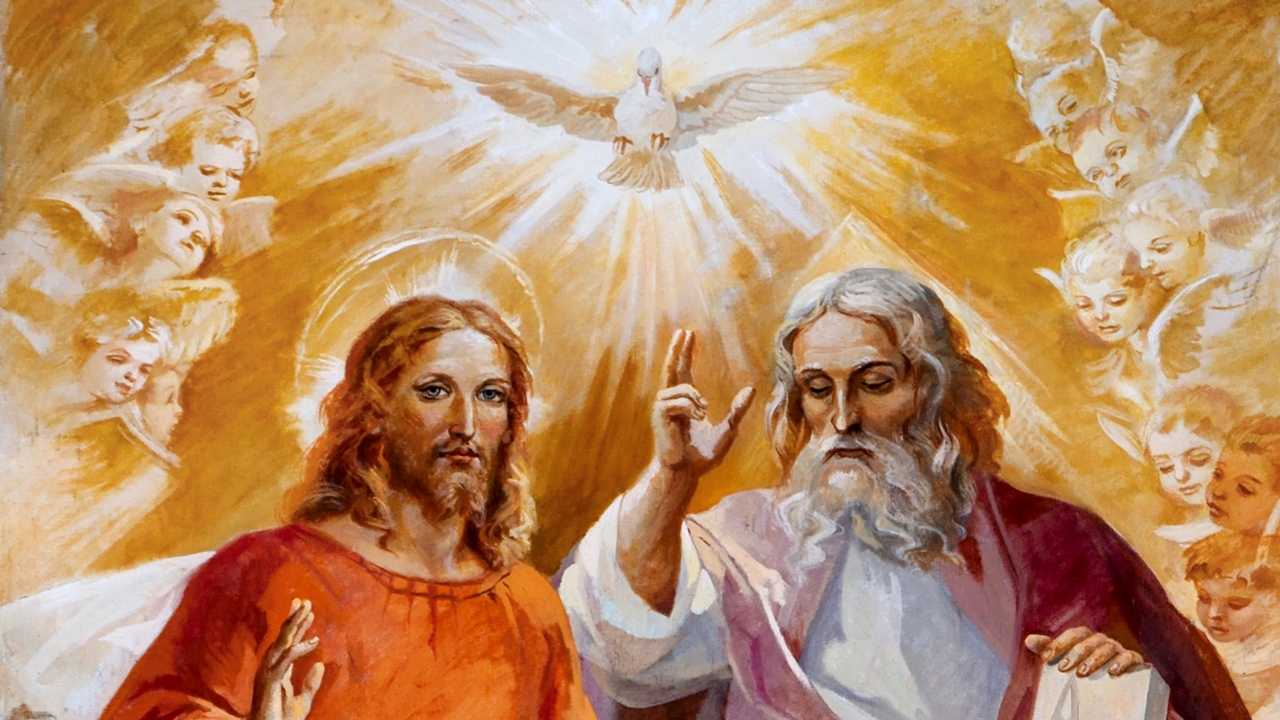No products in the cart.
What Is The Trinity? Do Christians Worship Three Gods
This post contains paid and/or affiliate links. I make a small commission at no extra cost to you. Please see our Privacy Policy.
In Christian theology, the concept of the Trinity refers to the belief that one God exists in three distinct persons: the Father, the Son (Jesus Christ), and the Holy Spirit. This doctrine is central to the Christian faith and sets Christianity apart from other monotheistic religions. Despite the complexity of this concept, Christians believe that the Trinity reveals the nature of God and His relationship with humanity.
The idea of the Trinity is not explicitly stated in the Bible. Still, it is derived from various passages suggesting the presence of three distinct persons within the Godhead. These include the baptism of Jesus, where all three persons of the Trinity are present simultaneously, and references to the Father, Son, and Holy Spirit in the teachings of Jesus and the writings of the apostles.
The development of the concept of the Trinity took several centuries and was shaped by the early Church’s discussions and debates. The Council of Nicaea in 325 AD played a significant role in formulating the doctrine, affirming that Jesus is “of the same substance” as the Father, thereby combating various heresies that arose during that time.
While the concept of the Trinity can be challenging to grasp fully, it emphasizes the unity and diversity within God’s being. The Father, Son, and Holy Spirit are not three separate gods but distinct persons who share the same divine essence. They are co-equal and co-eternal, and each plays a unique role in the redemption and salvation of humanity.
Some people misunderstand the concept of the Trinity and mistakenly believe that Christians worship three gods. However, this is different. Christianity is unequivocally monotheistic, affirming the belief in one God. The Trinity does not suggest that there are multiple gods but highlights the complex nature of the one true God.
In Christian worship and belief, the Trinity holds great significance. It provides a framework for understanding God’s love, grace, and salvation. The Father is believed to be the creator and sustainer of the universe, the Son is seen as the Word-made flesh who came to redeem humanity, and the Holy Spirit is considered the source of spiritual guidance, comfort, and empowerment.
The concept of the Trinity is a foundational doctrine of Christianity that seeks to capture the mysterious nature of God. While it may be challenging to comprehend fully, it is a testament to the richness and depth of the Christian faith.
The Concept of the Trinity in Christian Theology
The concept of the Trinity plays a central role in Christian theology. It posits that one God exists in three distinct persons: the Father, the Son (Jesus Christ), and the Holy Spirit. While this belief is readily accepted by many Christians today, the development of the doctrine was a complex process that spanned several centuries.
In the early years of Christianity, the concept of the Trinity was not explicitly defined. Instead, early Christians focused on understanding and articulating the relationship between God the Father and Jesus Christ. Only in the Council of Nicaea in 325 AD was the divinity of Christ formally affirmed, establishing the foundation for the doctrine of the Trinity.
The Council of Nicaea rejected the teachings of Arius, a priest who claimed that Jesus, as the Son of God, was subordinate to God the Father and, therefore, not fully divine. This controversy led to the formulation of the Nicene Creed, which clarified the belief in the Trinity as an essential component of Christian faith.
ADVERTISEMENT
Over the following centuries, theologians and church leaders further expounded on the nature of the Trinity. The Council of Constantinople in 381 AD affirmed the divinity of the Holy Spirit, completing the formulation of the doctrine as it is understood today.
To comprehend the Trinity, it is crucial to understand the distinct roles played by each person. The Father is understood as the creator and sustainer of the universe, the Son is seen as the incarnation of God who became human to save humanity, and the Holy Spirit is viewed as the presence of God in the world, guiding and empowering believers.
It is important to note that the doctrine of the Trinity does not imply the worship of three separate gods. Christians worship one God who exists in three co-equal, co-eternal persons. The Father, Son, and Holy Spirit are distinct yet unified, forming a divine relationship known as perichoresis, characterized by perfect love and harmony.
The significance of the Trinity in Christian worship and belief cannot be overstated. It provides a framework for understanding the nature of God and His relationship with humanity. The Trinity also affirms the unity and diversity within the Godhead, reflecting the importance of community and fellowship in Christian life.
The doctrine of the Trinity is a foundational belief in Christianity. It emerged through the deliberations of church councils and the efforts of theologians to define the nature of God as three distinct persons in one essence. Christians do not worship three gods but one God who exists in perfect unity as Father, Son, and Holy Spirit.
The Trinity holds deep significance in Christian worship and belief, shaping how believers understand and relate to God.
Understanding the Three Persons of the Trinity
The concept of the Trinity is a fundamental belief in Christian theology. It holds that one God exists in three distinct persons: the Father, the Son (Jesus Christ), and the Holy Spirit. Each person in the Trinity is entirely God, yet there are not three separate gods but one God in three persons.
The Father is often seen as the creator and sustainer of the universe. He is the source of all life and the ultimate authority in the divine hierarchy. The Father is called God the Father, reflecting his role as the paternal figure in the Trinity.
The Son, Jesus Christ, is regarded as the incarnation of God. Christians believe that Jesus is fully God and fully human, having both divine and human nature. He is seen as the second person of the Trinity and is often called God the Son. The Son is believed to have taken on human form to redeem humanity from sin and offer salvation.
The Holy Spirit is viewed as the presence of God in the world today. It is described as the third person of the Trinity, with its role being to guide, teach, and empower believers. The Holy Spirit is the source of spiritual gifts, convicts people of sin, and leads them to faith in Jesus Christ. In Christian worship, the Holy Spirit is often invoked to bring about an encounter with God’s presence and transformation in believers’ lives.
Advertisement. Scroll to continue reading.
It is essential to note that Christians do not worship three separate gods. They worship one God who has revealed Himself in three persons. The belief in the Trinity attempts to make sense of the biblical data that presents God as both one and yet three. While the concept of the Trinity may be challenging to comprehend fully, it is foundational to Christian faith and belief.
The doctrine of the Trinity developed over several centuries as the early Christian community sought to articulate its understanding of God based on the biblical texts. Various theologians and church councils significantly shaped the language and concepts used to describe the Trinity. The Nicene Creed, formulated in the 4th century, became the standard statement of faith for many Christian traditions and included a clear affirmation of the Trinity.
The concept of the Trinity is central to Christian theology. It teaches that one God exists in three distinct persons: the Father, the Son, and the Holy Spirit. Each person in the Trinity is entirely God, yet they are not three separate gods. Christians do not worship three gods but rather one God who has revealed Himself in three persons. Understanding the Trinity has developed over time and is foundational to the Christian faith.
Clarifying Misconceptions: Do Christians Worship Three Gods?
The concept of the Trinity in Christian theology often leads to misunderstandings and misconceptions, one of the most common being the belief that Christians worship three separate gods. However, this notion needs to be revised. Christians believe in only one God, who has revealed Himself in three distinct persons: the Father, the Son (Jesus Christ), and the Holy Spirit. In this article, we will explore the nature of the Trinity and clarify the misconception regarding the worship of three gods.
To truly understand the Trinity, it is important to recognize that God is complex beyond our human comprehension. In the Bible, we see glimpses of this triune nature throughout the Old and New Testaments.
The Father is portrayed as the Creator, the source of all things, and who sent His Son into the world. Jesus, the Son, is depicted as God incarnate, the second person of the Trinity, who took on human form to redeem humanity through His life, death, and resurrection. The Holy Spirit is presented as the third person of the Trinity, who empowers and guides believers in their faith journey.
It is crucial to note that even though Christians acknowledge the three persons of the Trinity, they do not worship three separate gods. Instead, they worship one God who exists in three distinct persons. This belief is based on the biblical teaching that God is one and three. The doctrine of the Trinity seeks to reconcile these seemingly contradictory aspects of God’s nature.
The analogy often used to explain the Trinity is that of water existing in three states: solid (ice), liquid (water), and gas (steam). Although they have different forms, they are all still water at their core. Similarly, the Father, Son and Holy Spirit are distinct persons but share the same essence of God.
The unity of the Trinity is also evident in the mutual indwelling of the three persons. Each person of the Trinity exists in perfect harmony and unity with the others. They are inseparable and work together in perfect love, yet they are distinct in their roles and interactions with humanity.
Christians do not worship three gods but one God who exists in three persons: the Father, the Son, and the Holy Spirit. This concept of the Trinity can be challenging to grasp fully, as it goes beyond human comprehension. However, it is an essential aspect of Christian theology and worship, reflecting the complex nature of the one true God.
The Significance of the Trinity in Christian Worship and Belief
The Trinity is a fundamental concept in Christian theology that holds immense significance in Christian worship and belief. While it can be a complex and mysterious doctrine, understanding the Trinity is crucial for Christians as it shapes their understanding of God’s nature and relationship with humanity.
At its core, the Trinity refers to the belief in one God who exists in three distinct persons: the Father, the Son (Jesus Christ), and the Holy Spirit. Each person of the Trinity is entirely God, yet they are not three separate gods. Instead, they are united in essence and inseparable in their divine nature.
In Christian worship, the Trinity is often invoked through liturgical prayers, hymns, and creeds that express faith in the triune God. These expressions of worship acknowledge the Father as the Creator, the Son as the Savior and Redeemer, and the Holy Spirit as the Comforter and Guide. By recognizing and honoring each person of the Trinity, Christians seek to deepen their relationship with God and experience His multifaceted presence.
The Trinity also holds significance in Christian belief as it reveals God’s self-revelation and His desired relationship with humanity. In the Old Testament, glimpses of the Trinity can be found in passages that describe God’s presence and interactions with His people. However, it was through the incarnation of Jesus Christ that the fullness of the Trinity’s revelation was made known.
Jesus, the second person of the Trinity, took on human flesh and dwelt among us, offering salvation through His life, death, and resurrection. This divine act demonstrates God’s immense love and desire to reconcile humanity to Himself. The Trinity’s involvement in the redemptive work of Christ showcases the depth of God’s mercy, grace, and compassion.
Moreover, the Trinity plays a vital role in understanding the work of the Holy Spirit in the life of a believer. The Holy Spirit, the third person of the Trinity, empowers and guides Christians in their faith journey. Through His indwelling presence, the Holy Spirit brings conviction, comfort, and wisdom, enabling believers to grow holiness and engage in God’s mission.
The Trinity is not a concept of worshipping three gods but rather a profound understanding of the nature of God as revealed in Christian belief. Through the Trinity, Christians come to know God as the Father, the Son, and the Holy Spirit. By acknowledging and embracing the significance of the Trinity, Christians deepen their worship, strengthen their faith, and experience the fullness of God’s love and presence in their lives.
Conclusion
The concept of the Trinity in Christian theology is a foundational belief that distinguishes Christianity from other monotheistic religions. It affirms that God is one Being in three Persons – the Father, the Son (Jesus Christ), and the Holy Spirit. This doctrine emerged over centuries of theological reflection and debate, seeking to articulate the mystery of God’s nature.
To understand the Trinity, one must recognize that each Person is entirely God, yet distinct. The Father is the source of all things, the Son is begotten from the Father and became incarnate in Jesus Christ, and the Holy Spirit proceeds from the Father and the Son. Although this understanding may seem complex, it reflects an attempt to grasp the richness and depth of God’s presence and activity in the world.
It is crucial to clarify the misconception that Christians worship three gods. Despite believing in the three Persons of the Trinity, Christians unequivocally affirm that there is only one God. The Trinity does not imply polytheism but rather the complex unity of God’s nature. It is a mystery that invites reverence and humility, underscoring the vastness and profundity of God’s existence.
The significance of the Trinity in Christian worship and belief cannot be underestimated. It shapes the way Christians understand God’s love and relationship with humanity. Through his Son Jesus Christ, the Father reveals himself and sends the Holy Spirit as a guide and comforter. This threefold manifestation of God’s presence in believers’ lives fosters a deep sense of intimacy and communion with the divine.
Christians often invoke the Trinity in prayer, recognizing the distinct roles of each Person. They may address God the Father as the loving Creator, Jesus Christ the Son as the Redeemer and Savior, and the Holy Spirit as the sustainer and illuminator. Moreover, Christian liturgy and hymnody frequently reference the Trinity, underscoring its central place in worship practices.
The Trinity is a fundamental doctrine in Christian theology that articulates the complex unity of God’s nature. It seeks to capture the mystery of God’s existence as one Being in three distinct Persons – the Father, the Son, and the Holy Spirit. Christians do not worship three separate gods but instead affirm the oneness of God while acknowledging the trifold expression of God’s presence.
The Trinity shapes Christian worship and belief, fostering a deep intimacy and communion with the divine. It invites believers to enter the mystery with reverence and humility, recognizing that human language and understanding can never fully contain the vastness of God’s nature.












